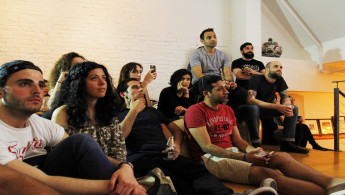'Flex the curiosity muscle': Community podcast Afikra dives deep into Arabic culture
It began six years ago in Brooklyn, at a rooftop event. Ideas were exchanged and a commitment was made. Mikey and friends set out to engineer a space where people could deep dive into Arabic history. The space would be reserved for a movement of curious people keen to host lectures, debates, interviews and more recently, Covid-19 friendly, digital gatherings.
The seed was planted and since then, Afikra has built up a scaffold that harnesses curiosity in pursuit of understanding of the past and present. Arabic history would be laid bare for people to enjoy, interrogate and retell.
At its core the organisation resists against surface-based learning and rejects identity tribalism. It's neither about your class, family name, ancestry, or any claim to pan-Arabism. Neither is it a response to the crisis of education in the Middle East.
No membership criteria exists, but among diaspora with firm roots in the region, and lovers of history, the initiative has proven popular.
 |
|
"A neutral network," Mikey describes it, embracing inquisitiveness and intellectual agnosticism.
"One person brings in ten people and gets them to be curious, and those people bring more people. That's how we've grown," he tells The New Arab.
As part of their involvement in Afikra, members of the 'curious-minded' demographic receive presentation and public speaking training. In other words, one-on-one mentoring.
"A commitment to contribute to the conversation" is the sole criteria for joining, Mikey said. The decision is entirely the speakers who are spoilt for choice by the giant that is ancient and contemporary Arabic history.
Speakers walk audiences through the corridors of Arabic literature, film, music, fashion and philosophy. Even large capital projects such as the controversial Suez Canal are discussed.
 |
A commitment to contribute to the conversation is the sole criteria for joining... The decision is entirely the speakers who are spoilt for choice by the giant that is ancient and contemporary Arabic history |  |
London-based volunteer, Usman Butt, delivered two talks since joining in 2019. In both, he strayed into a territory few have chartered — ancient Arabic fables.
For his initial talk, Usman settled on a 12th century, Andalusian, Arabic novel by philosopher Ibn Tufail, that tells the story "about a feral boy raised in the wild without any human contact," Usman explained, underlining the fables' popularity among European enlightenment thinkers.
The subject of his second talk, a 10th century fable written in Basra by a Sufi collective, sounds like the prequel to Orwell's, Animal Farm; The Animals' Lawsuit Against Humanity.
Usman received coaching along every step, but stressed the impact of the ongoing Covid-19 pandemic.
He described his second, Zoom-delivered talk, as a "very different experience" from the lively exchanges of a room-full of inquisitive people that attended his first talk.
Usman was struck by the deafening silence of Zoom software, much like Bayan Daha who joked during her presentation on Antara and Abla (the Middle Eastern Romeo and Juliet) about unrequited humour as a result of the "muted-Zoom mics" syndrome.
Despite that, social media has been instrumental to the growth of Afikra's rootless community, with the outpouring of digital content enhancing accessibility as of late.
 |
Social media has been instrumental to the growth of Afikra's rootless community, with the outpouring of digital content enhancing accessibility |  |
Afikra's Instagram debut a year ago, resulted in the launch of its eponymous short-form "story time" segment.
"There are so many people that only know us through story time," Mikey said. The format is a short 10-minute burst of information.
"Story time allows people who are not interested in presenting and don't feel as though they can command a room, or are quite shy, to excel."
Content production is key to Afikra's commitment to transfer and share knowledge, from one person to another, and from one group to the next.
More important than consumption for Afikra, is contribution, as one of its core values, alongside "interest over identity," and the maintenance of a kind, non-promotional space.
"You have to have attended a talk, to speak at a talk," Mikey explained.
Spoken word has stood out as the primary format, but two new series injecting visual and written content into Afikra's library, promise to change that.
"Q&A," will open the floor to artists, "that call the Arab world home," Mikey said. They will form an art collective producing work triggering that "Afrika," eureka, moment.
Slowly but consistently, Afikra is transforming into a digital village with its own all-access-free library. Every new member is a book added to that library.
"We admit that we are in a constant pursuit of understanding, which means that we're constantly in a state of misunderstanding. But we try to combat this by rolling up our sleeves, and delivering the work and research," Mikey said.
"I'm trying to role play this with the people I train, to encourage people to ask really primary questions," he added.
"In order to dive more deeply into the subject, you need that bread crumb."
Future aspirations for Mikey include the formalisation of Afikra's teaching aids and model into a curriculum that could move into schools in the Middle East. Mikey explained that he is keen for the movement to continue to grow organically, pushing the parameters as far as they go.
"One of our all-caps-bold, underlined goals for 2021," he revealed, "is to host events in Arabic," citing language limitations as the reason for producing predominantly English-language content. The pursuit extends also to French, another widely spoken language across parts of the Middle East.
As the floor continually expands, Afikra's passion remains alight in dark times. Members continue to craft engaging and provoking content, and inviting the world into the conversation that they hope future generations will keep having.
Nazli Tarzi is a freelance British-Iraqi journalist specialising in Middle East politics, with a particular interest in Iraqi affairs.



